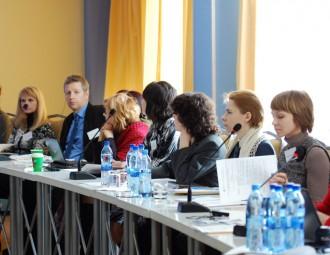Seminar on various aspects of quality assurance in higher education takes place in Minsk
 democraticbelarus.eu
democraticbelarus.eu
The seminar aimed at enhancing channels for communication and experience exchange between Belarusan experts and their colleagues from the EU and EaP states was held in Minsk on March 26.
The event was organised in the framework of the programme "EU and Belarus: Sharing Knowledge" by the Brussels-based Office for a Democratic Belarus and its partner organisation the Office for European Expertise and Communication.
The invited speakers to the seminar were: Josep Grifoll Sauri, a member of the board of Directors of the European Association for Quality Assurance in Higher Education representing Catalan University Quality Assurance Agency (Barcelona, Spain); Nino Chubinidze, the Director for Quality Assurance Department in Caucasus University (Tbilisi, Georgia), Banu Narbekova, Deputy Director of the Bologna and Academic mobility Centre of Kazakhstan and Professor Galina Parshina from the same organisation (Astana, Kazakhstan).
The seminar gathered more than 50 participants representing the Belarusian Ministry of Education, the National Institute for Higher Education, the National School on Higher Education, as well as representatives of different Belarusian universities from Minsk and the regions, members of students' initiatives and of NGOs working in the area of higher education.
Dr Josep Grifoll, spoke about the role of European Association for Quality Assurance in the European Higher Education Area, explained the organisation's principles of work and membership criteria, described main strands for national QA agencies, internal and external quality assurance procedures, guidelines for quality assurance and different ENQA projects. For more details please see his power-point presentation "ENQA a key player in the European Higher Education Area".
Dr. Nino Chubinidze, who in 2004-2009 headed the National Education Accreditation Centre of Georgia shared her experience of the Bologna transformation in Georgia. In her presentation she described ten years of development of the National quality system in Georgia giving a deeper insight into the establishment of the three level higher education system in the country; elaborating of the National Qualification Framework; transforming programmes into ECTS system; developing external quality enhancement system; ensuring mobility of students and academic staff; the process of modernisation of universities; as well as the development of internal quality assurance among universities; and initiating market driven tertiary education programmes to increase employability of graduates. (The presentation can be found at this link, while a detailed report in English or Russian is available upon request.
Dr. Banu Narbekova and Professor Galina Parshina from Astana shared with Belarusian colleagues their experience in developing Quality Assurance System of Kazakhstan, as well as assurance quality in PHD programmes. Kazakhstan joined the European Area of Higher education back in 2010 and already has significant progress with regards to universities' academic freedom and students' mobility. The country is now finalising the National framework of qualification that will allow it to move closer to the internationally accepted standards in higher education. ( Presentation by Banu Narbekova "Quality Assurance System of Kazakhstan and the Bologna principles" in Russian) Presentation by Galina Parshina "Quality Assurance of PhD programme of Kazakhstan" (in Russian)
The discussion was organised in an open manner providing Belarusian participants an opportunity to ask important for them questions and comment on the topics covered during the meeting. They expressed their interest in every stage of development of quality system in the EU countries, Georgia and Kazakhstan, discussed with their colleagues the participation of potential employers in the development of the university programmes, pluses and minuses of introduction of the credit system, academic mobility of students and teachers, and many other issues.
Apart from the seminar, invited experts participated in the meetings with the rector of the National Institute for Higher Education and the Dean of the International Relations Department of the Belarusian State University.
This seminar followed a number of study visits for Belarusian experts in higher education to Brussels, Maastricht and Tbilisi organised by the ODB and its partners. The organisers foresee conducting a series of lectures in the Belarusian universities as well as a conference on internationalisation of higher education this May in Minsk.
-
03.01
-
07.10
-
22.09
-
17.08
-
12.08
-
30.09



























